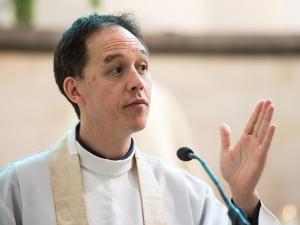
I start with the romantic notion that sex means something; it’s not just physical pleasure. If so, then sex naturally intends to be a source of beauty in the world. I add a religious theme: Sexual intimacy is one of God’s great gifts. If so, then it’s a way God saves the world, bringing us into unity and love out of isolation and self-centeredness. Why has this natural beauty and supernatural grace worked so poorly? Sex turns out to be a saving grace in need of saving.
Sex brings us together in love and pleasure, but often it expresses insecurity, pride, emotional pain, hatred, selfishness, manipulation, violence, lust for power, and even war instead. How could so great a beauty go so wrong? Sex is all around us and inside us. With so much grace, why is our world not a better place? Why aren’t we better than we are?
Maybe that’s the wrong question.
We are inundated with messages about self-improvement:
- Be all that you can be.
- Experience all that you can experience.
- Acquire more than you can afford.
- Control your body or your world in six easy steps.
A guest at a wedding was explaining her philosophy by drawing a box of nine dots. To connect all the dots with four straight lines, you have to go outside the box. She was getting a divorce. She needed, she said, to go “outside the stifling box” of marriage.
We hear repeatedly, “You need to be better than you are.” Not many of these messages are about sex, but very many that aren’t pretend that they are. Not one of them, no matter how good the advice, is about salvation.
Salvation is not acquiring something we don’t have or becoming something we are not yet. It is not a climb from a lower state to a higher state. Salvation is what God has done for us already. If we still need to be saved, it’s because we refuse to be what we are. When we make sex part of our struggle to be more—more powerful, more secure, even more happy—then we are not letting sex be what it is. Then that part of us may be the part that most needs saving.
Sex is not a means to an end. In Catholic thought sex has two natural “ends”—procreation and mutual support; but there is not a means-end relationship. It’s not like this, here, is sex, and with it I can get that goal, there. It’s like an acorn, which just naturally ends up as an oak if you let it be what it is. We just need to let our sexuality be what it is.
How do you let sex be what it is?
When I was part of a group studying for the priesthood, I heard a passionate plea. This person insisted that giving up sexual intimacy is refusing to be a complete human being. That way of thinking is the opposite of letting sex be what it is; but it was a very easy mistake to make. To avoid that mistake is to realize that God didn’t make any half human beings. Contrary to what the world wants us to believe, each person is whole already.
Sexual intercourse celebrations what is already. It is not part of any pursuit, not even the pursuit of wholeness or happiness. But it is easy to make it over into a means to some end or other because we don’t believe we are whole. We have highly paid advertisers whose job is to make sure we never do. They seem to have no qualms about making sex a means to their own ends.
Letting sex be what it is—that’s not something that a person does by some extraordinary effort. There are manuals on enhancing sexual enjoyment that can be worth reading, but that’s not what I’m thinking of. Neither is it a matter of some undeniable feeling that this is “true love.” Rather, to put it boldly, saving sex is the accomplishment of the sacrament of Matrimony.
That’s not just for Catholics. All Christians marry sacramentally, according to Catholic teaching, when they follow the procedures of their own churches. For any couple who marry with the intention of being faithful until death, marriage provides the context in which sex can be what it is—something you do because of what you are, not what you need to be but aren’t yet.
Matrimony takes away some of the confusion about sexual feelings.
Marriage, even a sacramental one, is no guarantee against abuses of sexuality. Matrimony is not the same as paradise. A mutually supportive sex life is something that loving couples know they have to work at. But just as God gives two human beings the grace of lifelong fidelity, God also graces marital sexuality so that it reflects and celebrates the love that is there already.
But how do you know it’s love? When love is just a feeling, you don’t know. A feeling is confusing. We imagine it comes from deep inside us and that there’s nothing more plain than this deeply held feeling. It’s actually nearly the opposite. But if love is a commitment, signed and sealed in public, with the good wishes and support of one’s community, then there are guarantees. You can be pretty sure.
Then sex doesn’t have to assure us of anything. It doesn’t have to hold back any of what often gets mixed up in our feelings—our sense of inferiority, our insecurities, or our pride and public image. Sex doesn’t have to make us whole. In marriage sex can be just what it is—a sharing of love and pleasure that just naturally supports a couple’s life-long commitment to each other and to life’s ongoing adventure.
Not every grace of God saves the world so delightfully.
Image credit: Snorg Tees via Google Images












